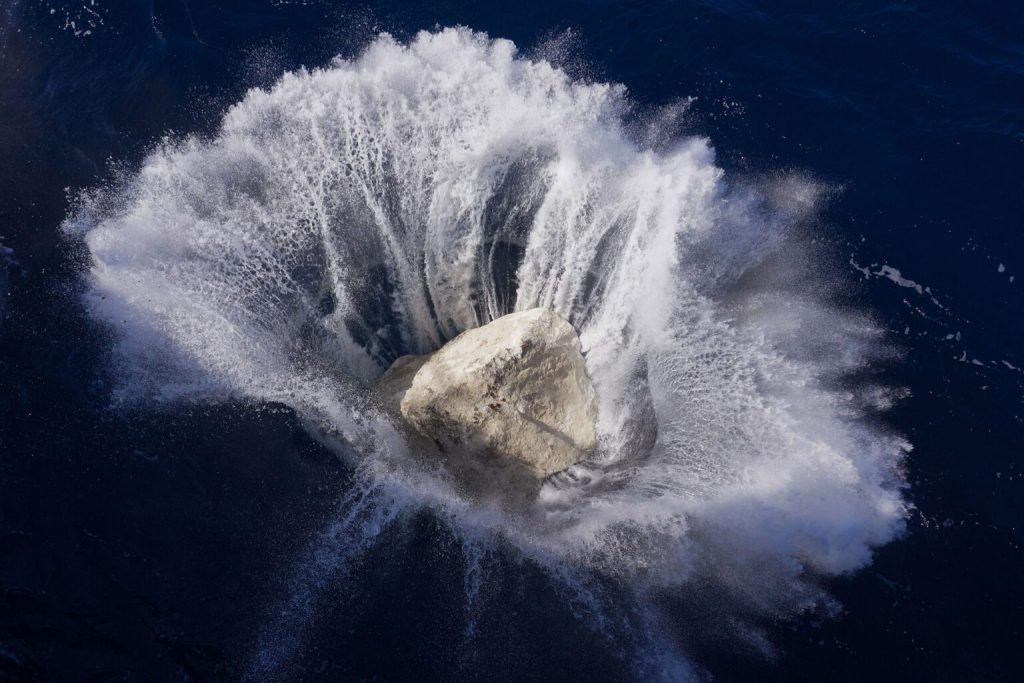“Bottom-trawling is like ploughing a combine harvester through a national park. They’re able to take out entire ecosystems, and if they cause a fishery to collapse, they just move on to the next one.”
“We are very disappointed that Greenpeace has chosen to take this action to drop boulders to form a barrier as we don’t believe it is justified or will help protect our marine environment.”
.
A year ago, concerns were being raised about intensive fishing methods – even within so-called protected areas – with a parliamentary committee and Greenpeace asking questions:
Bottom-trawling in Marine Protected Areas – Vision Group for Sidmouth
Two years ago, Greenpeace were dropping boulders to hamper such fishing methods:
Marine conservation after Brexit – Vision Group for Sidmouth

And now it seems they are at it again:
5 reasons why Greenpeace built another underwater boulder barrier | Greenpeace UK
This has been widely reported in the press:
Greenpeace drops boulders onto seabed to block ‘destructive fishing’ | The Independent
Greenpeace drops boulders in UK sea against ‘destructive’ fishing | Environment News | Al Jazeera
Including the science press:
Greenpeace UK said Friday it had dropped 18 large boulders on the seabed in a marine conservation zone off the coast of southwest England to prevent “destructive” industrial fishing. The environmental campaigners sailed to the western part of the Channel between the UK and France, loaded with the boulders of Portland limestone, each weighing between 500 and 1,400 kilograms (1,100 and 3,100 pounds).”We are placing large limestone boulders on the seabed to create a protective underwater barrier which will put the area off limits to destructive fishing,” Anna Diski, UK oceans campaigner, told AFP on board. The action would make it “impossible for them to drag the heavy fishing gear along the seabed, destroying the habitat and disturbing the carbon”, she added...
The action comes after the latest round of UN talks to try to secure protection for marine life in international waters broke up without agreement. Greenpeace said the 4,600-square-kilometre (1,776-square-mile) South West Deeps is “one of the most heavily fished so-called Marine Protected Areas in the UK”…
Neil Whitney, a fisherman from East Sussex in southern England, said bottom-trawling was “like ploughing a combine harvester through a national park. They’re able to take out entire ecosystems, and if they cause a fishery to collapse, they just move on to the next one,” he added. “Industrial fishing, like fly-shooters (vessels which tow lead-weighted ropes along the seabed) and supertrawlers (trawlers over 100 metres long), are killing our marine environment, and small-scale UK fishermen like me are losing out big time.” He said it was “absurd” that bottom-trawling was legal in MPAs. “MPAs are supposed to be the areas where fish stocks can recover, so that we fish for generations to come. It’s a case of common sense.”
Greenpeace drops boulders on UK seabed to curb bottom-trawling fishing
And the West Country press:
Greenpeace has placed a number of boulders on an area of seabed off the coast of Cornwall in an attempt to block what it describes as “destructive industrial fishing”.
However, Barry Deas, CEO of the National Federation of Fishermen’s Organisations, said that “boulders of that size represent a threat to the crews and the vessels that fish the area”, adding that they could be “a potential threat to life”…
The Marine Management Organisation (MMO) has said that the action is potentially illegal and has launched an investigation. A spokesperson from the MMO said: “We are very disappointed that Greenpeace has chosen to take this action to drop boulders to form a barrier as we don’t believe it is justified or will help protect our marine environment. It is also a requirement under the Marine and Coastal Access Act that any deposit of construction below high water is required to have a Marine Licence. Greenpeace do not hold, nor have they applied for one, and as such their activity is potentially illegal. As unlicensed activity has now taken place, MMO has launched a formal investigation in accordance with its regulatory function around marine licensing enforcement and is gathering evidence before considering its next response.”
Greenpeace drops boulders off Land’s End coast of Cornwall over fishing | Falmouth Packet